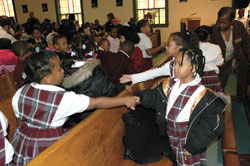Tuition assistance for consortium schools aided by grant

Holy Angels School first-graders Kumba Songor, left, and Karrington Abstone of Indianapolis shake hands during the Sign of Peace on Jan. 12 at Holy Angels Church as part of a memorial Mass honoring the life and ministry of Dr. Martin Luther King Jr. St. Anthony School students also participated in the march and Mass as part of their classroom lessons about the Civil Rights Movement during the 1960s. (Photo by Mary Ann Wyand)
By Sean Gallagher
Through a $1.5 million grant recently made to the archdiocese by the Ruth Lilly Philanthropic Foundation, additional need-based tuition assistance will be available for students at the six schools that make up the Catholic Urban School Consortium.
Half of the grant will be put into the archdiocese’s Making a Difference Fund, which distributes need-based scholarship grants in perpetuity in the consortium schools.
“I am sincerely grateful to the Ruth Lilly Philanthropic Foundation for recognizing and investing in the future of the Catholic Urban School Consortium students,” said Archbishop Daniel M. Buechlein.
“This extraordinary gift will give students attending consortium schools renewed hope for a brighter future by giving them the educational opportunity needed to break the cycle of poverty,” he said. “Our students will continue to thrive in an academically challenging environment while they receive a values-based, faith-filled education.”
Another $375,000 from the grant will fund current tuition assistance needs in the consortium schools.
According to Annette “Mickey” Lentz, executive director of the archdiocesan Office of Catholic Education, this is the largest grant that the consortium has received.
The schools that make up the Catholic Urban School Consortium, all in Indianapolis, are Central Catholic School, Holy Angels School, Holy Cross Central School, St. Andrew and St. Rita Catholic Academy, St. Anthony School and St. Philip Neri School.
Connie Zittnan, director of the consortium, said that more than 90 percent of its schools’ students receive tuition assistance.
“So the impact is huge for the children in our schools,” she said. “It’s a big stretch financially most of the time for the families who send their children to our schools.”
In an interview with The Criterion, Zittnan recalled the impact that such assistance made in the life of one student and his family.
The student had been enrolled in a consortium school, but his parents withdrew him and sent him to a public school after they felt they could no longer afford the Catholic school’s tuition.
After the student asked “to come home” to the consortium school, his parents sought and received additional financial aid.
“I think for a lot of our children, it’s not just school,” Zittnan said. “They consider it family. They’re a support system for growing up.”
Lentz said the support that the consortium schools receive from the Ruth Lilly Philanthropic Foundation and other groups tied to the business community are a key support for the consortium schools.
“We are running very good schools,” Lentz said. “And as long as we have high expectations and set standards for those schools, then we feel that … the business community is going to continue to have faith in them and support them.” †
